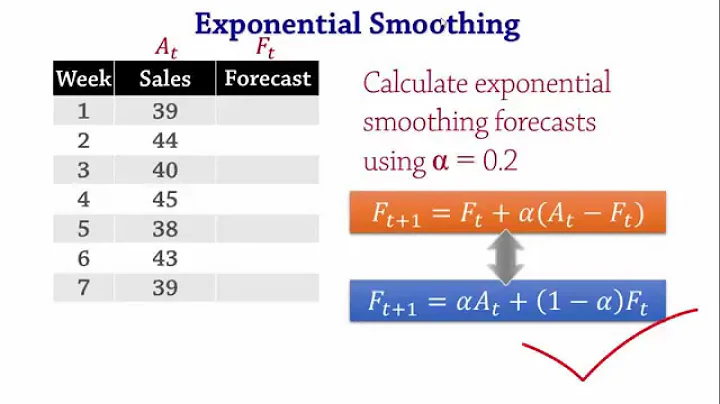Pandas: Exponential smoothing function for column
15,952
Perhaps you are looking for an exponentially weighted moving average:
import pandas as pd
import datetime as DT
df = pd.DataFrame({
'Trader': 'Carl Mark Carl Joe Mark Carl Max Max'.split(),
'Quantity': [5, 2, 5, 10, 1, 5, 2, 1],
'Date': [
DT.datetime(2013, 1, 1, 13, 0),
DT.datetime(2013, 1, 1, 13, 5),
DT.datetime(2013, 2, 5, 20, 0),
DT.datetime(2013, 2, 6, 10, 0),
DT.datetime(2013, 2, 8, 12, 0),
DT.datetime(2013, 3, 7, 14, 0),
DT.datetime(2013, 6, 4, 14, 0),
DT.datetime(2013, 7, 4, 14, 0),
]})
df.index = [df.Date, df.Trader]
df2 = df.unstack('Trader').resample('1W', how='mean').fillna(0)
print(df2.ewm(span=7).mean())
yields
Quantity
Trader Carl Joe Mark Max
Date
2013-01-06 5.000000 0.000000 2.000000 0.000000
2013-01-13 2.142857 0.000000 0.857143 0.000000
2013-01-20 1.216216 0.000000 0.486486 0.000000
2013-01-27 0.771429 0.000000 0.308571 0.000000
2013-02-03 0.518566 0.000000 0.207426 0.000000
2013-02-10 1.881497 3.041283 0.448470 0.000000
2013-02-17 1.338663 2.163837 0.319081 0.000000
2013-02-24 0.966766 1.562696 0.230437 0.000000
2013-03-03 0.705454 1.140307 0.168151 0.000000
2013-03-10 1.843158 0.838219 0.123605 0.000000
2013-03-17 1.362049 0.619423 0.091341 0.000000
2013-03-24 1.010398 0.459502 0.067759 0.000000
2013-03-31 0.751651 0.341831 0.050407 0.000000
2013-04-07 0.560329 0.254823 0.037576 0.000000
2013-04-14 0.418350 0.190254 0.028055 0.000000
2013-04-21 0.312703 0.142209 0.020970 0.000000
2013-04-28 0.233936 0.106388 0.015688 0.000000
2013-05-05 0.175120 0.079640 0.011744 0.000000
2013-05-12 0.131154 0.059645 0.008795 0.000000
2013-05-19 0.098261 0.044687 0.006590 0.000000
2013-05-26 0.073637 0.033488 0.004938 0.000000
2013-06-02 0.055195 0.025101 0.003701 0.000000
2013-06-09 0.041378 0.018818 0.002775 0.500670
2013-06-16 0.031023 0.014108 0.002080 0.375377
2013-06-23 0.023261 0.010579 0.001560 0.281462
2013-06-30 0.017443 0.007933 0.001170 0.211057
2013-07-07 0.013080 0.005949 0.000877 0.408376
To concatenate this result with df2:
df3 = df2.ewm(span=7).mean()
df3.columns = pd.MultiIndex.from_tuples([('EWMA', item[1]) for item in df3.columns])
df2 = pd.concat([df2, df3], axis=1)
print(df2)
yields
Quantity EWMA
Trader Carl Joe Mark Max Carl Joe Mark Max
Date
2013-01-06 5 0 2 0 5.000000 0.000000 2.000000 0.000000
2013-01-13 0 0 0 0 2.142857 0.000000 0.857143 0.000000
2013-01-20 0 0 0 0 1.216216 0.000000 0.486486 0.000000
2013-01-27 0 0 0 0 0.771429 0.000000 0.308571 0.000000
2013-02-03 0 0 0 0 0.518566 0.000000 0.207426 0.000000
2013-02-10 5 10 1 0 1.881497 3.041283 0.448470 0.000000
2013-02-17 0 0 0 0 1.338663 2.163837 0.319081 0.000000
2013-02-24 0 0 0 0 0.966766 1.562696 0.230437 0.000000
2013-03-03 0 0 0 0 0.705454 1.140307 0.168151 0.000000
2013-03-10 5 0 0 0 1.843158 0.838219 0.123605 0.000000
2013-03-17 0 0 0 0 1.362049 0.619423 0.091341 0.000000
2013-03-24 0 0 0 0 1.010398 0.459502 0.067759 0.000000
2013-03-31 0 0 0 0 0.751651 0.341831 0.050407 0.000000
2013-04-07 0 0 0 0 0.560329 0.254823 0.037576 0.000000
2013-04-14 0 0 0 0 0.418350 0.190254 0.028055 0.000000
2013-04-21 0 0 0 0 0.312703 0.142209 0.020970 0.000000
2013-04-28 0 0 0 0 0.233936 0.106388 0.015688 0.000000
2013-05-05 0 0 0 0 0.175120 0.079640 0.011744 0.000000
2013-05-12 0 0 0 0 0.131154 0.059645 0.008795 0.000000
2013-05-19 0 0 0 0 0.098261 0.044687 0.006590 0.000000
2013-05-26 0 0 0 0 0.073637 0.033488 0.004938 0.000000
2013-06-02 0 0 0 0 0.055195 0.025101 0.003701 0.000000
2013-06-09 0 0 0 2 0.041378 0.018818 0.002775 0.500670
2013-06-16 0 0 0 0 0.031023 0.014108 0.002080 0.375377
2013-06-23 0 0 0 0 0.023261 0.010579 0.001560 0.281462
2013-06-30 0 0 0 0 0.017443 0.007933 0.001170 0.211057
2013-07-07 0 0 0 1 0.013080 0.005949 0.000877 0.408376
Related videos on Youtube
Author by
Andy
Updated on June 04, 2022Comments
-
Andy almost 2 years
I have the following DataFrame with trading data:
df = pd.DataFrame({ 'Trader': 'Carl Mark Carl Joe Mark Carl Max Max'.split(), 'Quantity': [5,2,5,10,1,5,2,1], 'Date' : [ DT.datetime(2013,1,1,13,0), DT.datetime(2013,1,1,13,5), DT.datetime(2013,2,5,20,0), DT.datetime(2013,2,6,10,0), DT.datetime(2013,2,8,12,0), DT.datetime(2013,3,7,14,0), DT.datetime(2013,6,4,14,0), DT.datetime(2013,7,4,14,0), ]}) df.index = [df.Date, df.Trader]I hope to compute weekly statistics for each trader with the average order volumes. To do so I am currently unstacking the trader column and resample the data using:
df.unstack('Trader').resample('1W', how='mean').fillna(0)Is there any possibility to compte also a column for each trader with a trend function for the trading volume (preferably a exponential smoothing function based on the previous trades of the trader) ?
Thanks
Andy
-
unutbu almost 11 years
df.unstack('Trader').fillna(0).resample('1W', how='mean')raises an error. Can you fix the example so we can understand your situation more clearly? -
Andy almost 11 yearsHi unutbu, thanks for your comment. Sorry, I forgot to specify the index separately. Have a try with the updated DataFrame. Thanks
-
-
Andy almost 11 yearsThank you unutbu for your answer, this is exactly what I was looking for. Is there any possibility to integrate this new dataframe into the original one? I would like to have both the actual and the trend in the same dataframe?
-
Pierre H. almost 6 yearsAs of pandas 0.18 (March 2016), the
pd.ewmafunction is deprecated, likepd.rolling_meanand similar functions for rolling statistics. The new approach is based on Exponentially Weighted Windows. In the code example,pd.ewma(df2, span=7)should becomedf2.ewm(span=7).mean().




